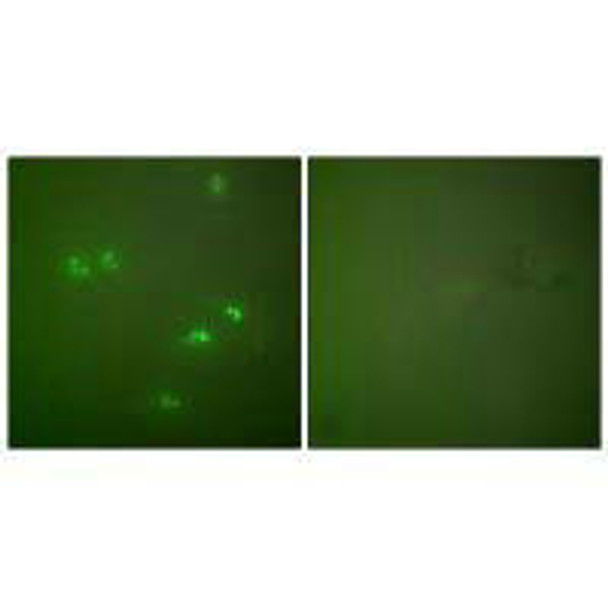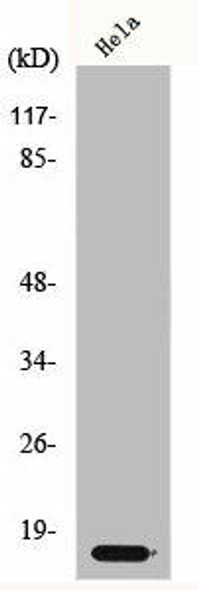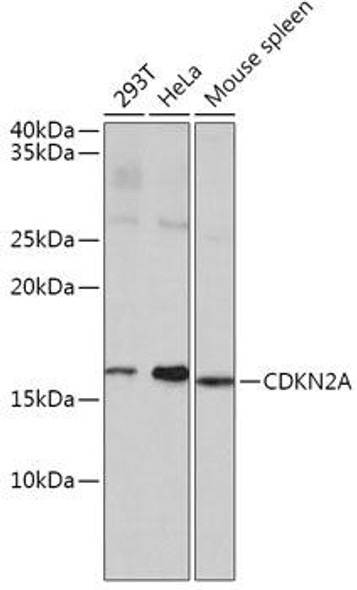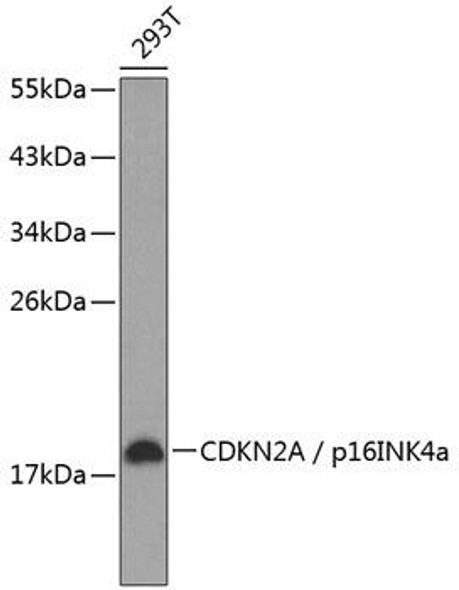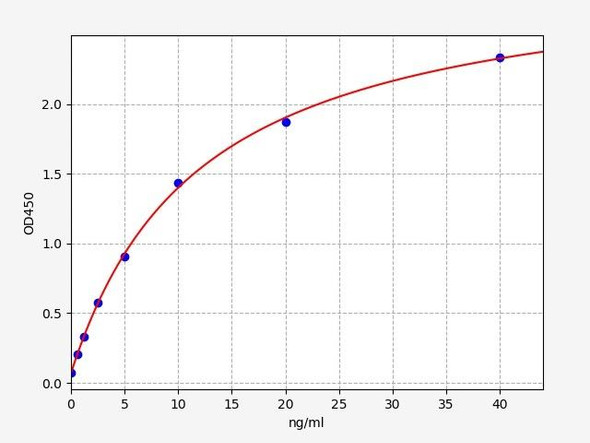Description
CDKN2A Antibody (PACO23834)
The CDKN2A Antibody (PAC023834) is a polyclonal antibody specifically designed for research involving the CDKN2A protein, also known as Cyclin Dependent Kinase Inhibitor 2A. This protein is crucial for cell cycle regulation, acting as a tumor suppressor and preventing uncontrolled cell growth.Raised in rabbits, this antibody is highly reactive with human samples and has been validated for use in Western blot applications. By binding to the CDKN2A protein, researchers can efficiently detect and analyze its expression in various cell types, making it ideal for studies in oncology and cell biology.
The CDKN2A protein is a key player in the regulation of cell proliferation and senescence, making it a valuable target for research into cancer and aging-related diseases. Understanding its role and activity can provide insights into potential therapeutic strategies for targeting tumor growth and promoting healthy cell function.Overall, the CDKN2A Antibody (PAC023834) offers researchers a reliable tool for studying the CDKN2A protein and its implications in cancer biology, providing a deeper understanding of cell cycle control and potential avenues for therapeutic intervention.
| Antibody Name: | CDKN2A Antibody (PACO23834) |
| Antibody SKU: | PACO23834 |
| Size: | 100ul |
| Host Species: | Rabbit |
| Tested Applications: | ELISA, WB, IHC, IF |
| Recommended Dilutions: | ELISA:1:2000-1:10000, WB:1:500-1:3000, IHC:1:50-1:100, IF:1:100-1:500 |
| Species Reactivity: | Human |
| Immunogen: | Synthesized peptide derived from human p14 ARF antibody. |
| Form: | Liquid |
| Storage Buffer: | Rabbit IgG in phosphate buffered saline (without Mg2+ and Ca2+), pH 7.4, 150mM NaCl, 0.02% sodium azide and 50% glycerol. |
| Purification Method: | The antibody was affinity-purified from rabbit antiserum by affinity-chromatography using epitope-specific immunogen. |
| Clonality: | Polyclonal |
| Isotype: | IgG |
| Conjugate: | Non-conjugated |
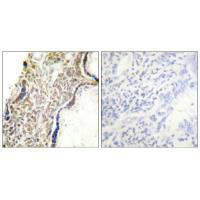 | Immunohistochemical analysis of paraffin-embedded human placenta tissue using p14 ARF antibody. |
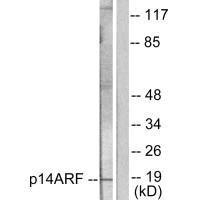 | Western blot analysis of extracts from HeLa cells, using p14 ARF antibody. |
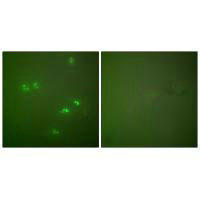 | Immunofluorescence analysis of HeLa cells, using p14 ARF antibody. |
| Background: | Capable of inducing cell cycle arrest in G1 and G2 phases. Acts as a tumor suppressor. Binds to MDM2 and blocks its nucleocytoplasmic shuttling by sequestering it in the nucleolus. This inhibits the oncogenic action of MDM2 by blocking MDM2-induced degradation of p53 and enhancing p53-dependent transactivation and apoptosis. Also induces G2 arrest and apoptosis in a p53-independent manner by preventing the activation of cyclin B1/CDC2 complexes. Binds to BCL6 and down-regulates BCL6-induced transcriptional repression. Binds to E2F1 and MYC and blocks their transcriptional activator activity but has no effect on MYC transcriptional repression. Binds to TOP1/TOPOI and stimulates its activity. This complex binds to rRNA gene promoters and may play a role in rRNA transcription and/or maturation. Interacts with NPM1/B23 and promotes its polyubiquitination and degradation, thus inhibiting rRNA processing. Interacts with COMMD1 and promotes its 'Lys63'-linked polyubiquitination. Interacts with UBE2I/UBC9 and enhances sumoylation of a number of its binding partners including MDM2 and E2F1. Binds to HUWE1 and represses its ubiquitin ligase activity. May play a role in controlling cell proliferation and apoptosis during mammary gland development. Isoform 6 may be involved in regulation of autophagy and caspase-independent cell death; the short-lived mitochondrial isoform isstabilized by C1QBP. UniProtKB Q64364 |
| Synonyms: | CDK4I; CMM2; MLM; MTS1; TP16 |
| UniProt Protein Function: | p16-INK4A iso4: a cell-cycle regulatory protein that interacts with CDK4 and CDK6, inhibiting their ability to interact with cyclins D. Inhibits the phosphorylation of the retinoblastoma protein by CDK4 or CDK6, and entry into the S phase of the cell cycle. The p16INK4A and p14ARF proteins are encoded by CDKN2A, a known tumour suppressor gene in multiple cancers. CDKN2A is inactivated in 72% of cases of lung squamous cell carcinoma: 21% by epigenetic silencing by methylation, 18% inactivating mutation, 4% by exon 1b skipping, and 29% by homozygous deletion. Defects in CDKN2A are the cause of familial atypical multiple mole melanoma-pancreatic carcinoma syndrome, Li-Fraumeni syndrome, and the melanoma-astrocytoma syndrome. The melanoma-astrocytoma syndrome is characterized by a dual predisposition to melanoma and neural system tumors, commonly astrocytoma. Four alternatively spliced p16 isoforms have been reported. Two alternatively spliced isoforms of ARF have been reported. |
| UniProt Protein Details: | Protein type:Tumor suppressor; Cell cycle regulation; Nucleolus Chromosomal Location of Human Ortholog: 9p21 Cellular Component: cytoplasm; cytosol; nucleus Molecular Function:cyclin-dependent protein kinase inhibitor activity; NF-kappaB binding; protein binding; protein kinase binding Biological Process: cell cycle arrest; G1/S transition of mitotic cell cycle; inhibition of NF-kappaB transcription factor; negative regulation of cell growth; negative regulation of cell proliferation; negative regulation of cell-matrix adhesion; negative regulation of cyclin-dependent protein kinase activity; negative regulation of phosphorylation; negative regulation of transcription, DNA-dependent; Ras protein signal transduction Disease: Li-fraumeni Syndrome 1; Melanoma, Cutaneous Malignant, Susceptibility To, 2; Melanoma-astrocytoma Syndrome; Melanoma-pancreatic Cancer Syndrome |
| NCBI Summary: | This gene generates several transcript variants which differ in their first exons. At least three alternatively spliced variants encoding distinct proteins have been reported, two of which encode structurally related isoforms known to function as inhibitors of CDK4 kinase. The remaining transcript includes an alternate first exon located 20 Kb upstream of the remainder of the gene; this transcript contains an alternate open reading frame (ARF) that specifies a protein which is structurally unrelated to the products of the other variants. This ARF product functions as a stabilizer of the tumor suppressor protein p53 as it can interact with, and sequester, the E3 ubiquitin-protein ligase MDM2, a protein responsible for the degradation of p53. In spite of the structural and functional differences, the CDK inhibitor isoforms and the ARF product encoded by this gene, through the regulatory roles of CDK4 and p53 in cell cycle G1 progression, share a common functionality in cell cycle G1 control. This gene is frequently mutated or deleted in a wide variety of tumors, and is known to be an important tumor suppressor gene. [provided by RefSeq, Sep 2012] |
| UniProt Code: | Q8N726 |
| NCBI GenInfo Identifier: | 384872321 |
| NCBI Gene ID: | 1029 |
| NCBI Accession: | Q8N726.2 |
| UniProt Secondary Accession: | Q8N726,Q13195, Q13399, Q16360, Q7KZR9, D3DRK2, |
| UniProt Related Accession: | P42771,Q8N726 |
| Molecular Weight: | 16,533 Da |
| NCBI Full Name: | Tumor suppressor ARF |
| NCBI Synonym Full Names: | cyclin dependent kinase inhibitor 2A |
| NCBI Official Symbol: | CDKN2A |
| NCBI Official Synonym Symbols: | ARF; MLM; P14; P16; P19; CMM2; INK4; MTS1; TP16; CDK4I; CDKN2; INK4A; MTS-1; P14ARF; P19ARF; P16INK4; P16INK4A; P16-INK4A |
| NCBI Protein Information: | cyclin-dependent kinase inhibitor 2A |
| UniProt Protein Name: | Tumor suppressor ARF |
| UniProt Synonym Protein Names: | Alternative reading frame |
| Protein Family: | Tumor suppressor |
| UniProt Gene Name: | CDKN2A |
| UniProt Entry Name: | ARF_HUMAN |
| Antibodies |
| CDKN2A Antibody (PACO01276) |
| Secondary Antibody |
| Anti-HRP Goat Anti-Rabbit IgG (H+L) Antibody (CABS014) |
| Recommended Products |
| Anti-FITC Goat Anti-Rabbit IgG (H+L) Antibody (CABS011) |
| Anti-HRP-conjugated Beta Actin Antibody (CABC028) |



